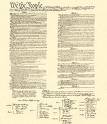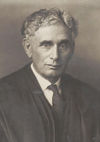Interpretation Wars: What Are They Good For? Absolutely Nothing!
 Constitutional theory and adjudication has been obsessed by two fundamental questions: (1) The Interpretive Question: What is the meaning of the Constitution and (2) The Institutional Question: Who should decide? The first question has received the lion's hare of attention. Those impressed with its importance have been furiously fighting, what in effect are "the interpretation wars" for decades. These wars are over which interpretive methodology should prevail in ascertaining the Constitution's meaning and therefore how should constitutional provisions be applied to contemporary situations. Among the candidates for the title of the "correct interpretive methodology" are: are: textualism, originalism, structuralism, "precedentalism," historicism, formalism, functionalism, and pragmatism. Of course, there is considerable overlap between and among these interpretive strategies, and some are inter-related in interesting and significant ways.
Constitutional theory and adjudication has been obsessed by two fundamental questions: (1) The Interpretive Question: What is the meaning of the Constitution and (2) The Institutional Question: Who should decide? The first question has received the lion's hare of attention. Those impressed with its importance have been furiously fighting, what in effect are "the interpretation wars" for decades. These wars are over which interpretive methodology should prevail in ascertaining the Constitution's meaning and therefore how should constitutional provisions be applied to contemporary situations. Among the candidates for the title of the "correct interpretive methodology" are: are: textualism, originalism, structuralism, "precedentalism," historicism, formalism, functionalism, and pragmatism. Of course, there is considerable overlap between and among these interpretive strategies, and some are inter-related in interesting and significant ways.Often, in any particular era there will be an influential jurist who insists (without the slightest indication that he or she might be wrong) that a particular methodology is the correct one and that it should be used exclusively. Just as often another jurist, scholar, practitioner, or movement condemns that methodology and champions another. Different
 methodologies make comebacks in different eras and then are discarded at least for the moment. Recently, textualism and originalism, though moribund two decades ago, have made a comeback, and formalism, their country cousin, seems to be following suit. These battles continue interminably with no single methodology or set of methodologies prevailing across the constitutional community.
methodologies make comebacks in different eras and then are discarded at least for the moment. Recently, textualism and originalism, though moribund two decades ago, have made a comeback, and formalism, their country cousin, seems to be following suit. These battles continue interminably with no single methodology or set of methodologies prevailing across the constitutional community.Ultimately, these battles rest on whether judges can interpret and apply law without making it. The dichotomy between law and politics underlies these interpretive wars with "legalists" insisting roughly that there must be neutral or relatively neutral methods for answering questions of law, while those pushing the political paradigm insist that law cannot be separated from politics or from political philosophy. There seems to be no end to these battles. But there could be if there's reason for the interpretation wars to cease and desist. Are there such reasons?
I think so. The reason the interpretation wars should come to an end is simply because they are unwinnable. No jurist or scholar can ever hope to formulate an interpretive methodology(s)--no matter how elegant and penetrating--and convince other members of the constitutional community to get on board. Don't get me wrong. He or she might attract some fellow travelers, but that's hardly prevailing. These wars are unwinnable because each interpretive methodology is essentially contested and will continue to be so. Moreover, the very idea of "the correct methodology" in a diverse intellectual and political setting is explanatorily unhelpful and cannot prevent contestation. Accordingly, no interpretive strategy--either an ad hoc ranking or lexically ordered hierarchy of interpretative strategies--will ever prevail permanently. This does not mean there is no correct interpretive methodology only that as long as there is reason to believe in the persistence of reasonable disagreement, no one can hope to prevail. Alternatively stated, there's no one methodology that it is irrational not to accept. To my mind
 this proves that interpretation is inseparable from politics--in the sense of contextual or applied political philosophy--but to insist on this point is to enter into the interpretation wars as a combatant and that's precisely antithetical to the point of this post. In making this anti-interpretation point, one needs to be careful not to be drawn back into the wars. It makes one feel like Michael Corleone in Godfather, III: "Just when I thought that I was out they pull me back in." Let's be careful not to be pulled back into the interpretation wars.
this proves that interpretation is inseparable from politics--in the sense of contextual or applied political philosophy--but to insist on this point is to enter into the interpretation wars as a combatant and that's precisely antithetical to the point of this post. In making this anti-interpretation point, one needs to be careful not to be drawn back into the wars. It makes one feel like Michael Corleone in Godfather, III: "Just when I thought that I was out they pull me back in." Let's be careful not to be pulled back into the interpretation wars.I
 f we do not recognize the futility of the interpretation wars, ten years from now some one will devise an ingenuous take on some faded interpretive strategy and scholars will fall over each other trying to refute or defend it. And once renounced as every ingenuous take on some faded interpretive strategy ultimately is, some scholar will devise another ingenuous depiction of some other faded interpretive strategy. And so on and so on. This is futility pure and simple. The point is that even if you are right about the correct interpretive methodology, from some Archimedean perspective, you will never persuade enough of your colleagues that you are right, for clearly predictable reasons, and thus neither you nor anyone else will ever secure some canonical conception of the correct interpretive methodology. So isn't there a better way for constitutional scholars to spend their time? Engaging and reengaging in the interpretation wars is, futile, perhaps even insane in the Einsteinian sense of doing the same thing over and over again expecting new results. Let's resist this futility and end the interpretation wars once and for all. Instead let's turn our attention to the institutional question of who should have the authority to interpret the Constitution whatever strategy it uses.
f we do not recognize the futility of the interpretation wars, ten years from now some one will devise an ingenuous take on some faded interpretive strategy and scholars will fall over each other trying to refute or defend it. And once renounced as every ingenuous take on some faded interpretive strategy ultimately is, some scholar will devise another ingenuous depiction of some other faded interpretive strategy. And so on and so on. This is futility pure and simple. The point is that even if you are right about the correct interpretive methodology, from some Archimedean perspective, you will never persuade enough of your colleagues that you are right, for clearly predictable reasons, and thus neither you nor anyone else will ever secure some canonical conception of the correct interpretive methodology. So isn't there a better way for constitutional scholars to spend their time? Engaging and reengaging in the interpretation wars is, futile, perhaps even insane in the Einsteinian sense of doing the same thing over and over again expecting new results. Let's resist this futility and end the interpretation wars once and for all. Instead let's turn our attention to the institutional question of who should have the authority to interpret the Constitution whatever strategy it uses.The beauty of this change in direction is that it is clearly political. No one would expect it not to be. So if we, through ordinary politics or constitutional amendment, decide that institution X should have the authority to interpret the Constitution, it will reflect the convictions of the community after suitable deliberation. An added bonus is that if we decide to give the elected branches greater, or even dispositive, say in constitutional interpretation, whatever they decide individually or collectively is the most attractive theory of interpretation will be so. And its claim to legitimacy will not because their choice of methodology follows from the idea of interpretation, from the philosophy of language, or from the Constitution itself, but rather solely it was chosen by the representatives of the electorate.
Scholars, and intellectuals, should take stock of whether inherited debates
 over key terms or issues in various disciplines deserve to be respected and continued. Because past scholars or intellectuals have deemed various concepts, issues, and problems in their disciplines to be important, hardly means that we follow their lead? Make no mistake, we are introduced to scholarship and develop as scholars only by first inheriting a body of doctrine, concepts, and problems in our claimed areas of expertise. But that is not a sufficient reason, in my mind, to continue to debate problems simply because they were debated in the past when good arguments exist showing that they will never be resolved.
over key terms or issues in various disciplines deserve to be respected and continued. Because past scholars or intellectuals have deemed various concepts, issues, and problems in their disciplines to be important, hardly means that we follow their lead? Make no mistake, we are introduced to scholarship and develop as scholars only by first inheriting a body of doctrine, concepts, and problems in our claimed areas of expertise. But that is not a sufficient reason, in my mind, to continue to debate problems simply because they were debated in the past when good arguments exist showing that they will never be resolved.One might reply that debates over interpretive strategies are significant not only because one or more might be the correct interpretive methodology. There's value in debating these issues even if no one will ever prevail because we learn about the domain of constitutional theory, history, and adjudication by doing so. Fair enough! If that's the reason, then let's label it such, and not take these interpretation wars seriously as inquiries about constitutional truth.










0 Comments:
Post a Comment
<< Home